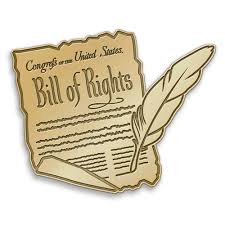|
| Amendments | US Supreme Court rulings | Comments |
| Amendment I: Freedoms, Petitions, Assembly Congress shall make no law respecting an establishment of religion, or prohibiting the free exercise thereof; or abridging the freedom of speech, or of the press, or the right of the people peaceably to assemble, and to petition the Government for a redress of grievances. |
Justice White's concurring opinion in Downes v. Bidwell, 182 U.S. 244 (1901) ("natural rights" include the right to one's own religious opinion, . . . to freedom of speech and of the press . . . . ) | With the expected future establishment of a "civil government" in Taiwan fully recognized by the officials of the US Executive Branch and members of Congress, the native Taiwanese people will have all necessary and appropriate channels to "petition the Government for a redress of grievances." |
| Amendment II: Right to bear arms A well regulated Militia, being necessary to the security of a free State, the right of the people to keep and bear Arms, shall not be infringed. |
The original wording of this Amendment speaks of "Militia." Militia refers to "civilians trained as soldiers but not part of the regular army," and is a form of military organization which existed in the American colonies. Taiwan does not have any history of the establishment of militia, or the private ownership of arms, with the possible exception of some aboriginal groups which have engaged in the hunting of live game. For more analysis, see -- 2nd Amendment. | |
| Amendment III: Quartering of soldiers No Soldier shall, in time of peace be quartered in any house, without the consent of the Owner, nor in time of war, but in a manner to be prescribed by law. |
As part of the United States' handling of Taiwan's defense responsibilities, the establishment of US military bases in Taiwan is entirely appropriate. All US soldiers should be assigned dormitory space and/or living quarters on such bases or at other officially established military housing facilities as necessary. | |
| Amendment IV: Search and arrest The right of the people to be secure in their persons, houses, papers, and effects, against unreasonable searches and seizures, shall not be violated, and no Warrants shall issue, but upon probable cause, supported by Oath or affirmation, and particularly describing the place to be searched, and the persons or things to be seized. |
The rights provided by the Fourth Amendment are generally considered to be "fundamental," which means that they apply of their own force to all individuals subject to the sovereignty of the United States. No statute is necessary to extend them to US territories and possessions. | It is notable that local legislation or local constitutional provisions of each of the larger US insular areas either explicitly apply the Fourth Amendment, or offer equivalent protections under local law, to insular area residents. |
| Amendment V: Rights in criminal cases No person shall be held to answer for a capital, or otherwise infamous crime, unless on a presentment or indictment of a Grand Jury, except in cases arising in the land or naval forces, or in the Militia, when in actual service in time of War or public danger; nor shall any person be subject for the same offence to be twice put in jeopardy of life or limb, nor shall be compelled in any criminal case to be a witness against himself, nor be deprived of life, liberty, or property, without due process of law; nor shall private property be taken for public use, without just compensation. |
Justice White's concurring opinion in Downes v. Bidwell, 182 U.S. 244 (1901) ("natural rights" include personal liberty and individual property; . . . free access to courts of justice; to due process of law and to an equal protection of the laws; . . . ); Ocampo v. United States, 234 U.S. 91 (1914) (Fifth Amendment grand jury provision inapplicable in Philippines); Hawaii v. Mankichi, 190 U.S. 197 (1903) (provisions on indictment by grand jury inapplicable in Hawaii); Malloy v. Hogan, 378 U.S. 1 (1964) (Fifth Amendment privilege against self-incrimination is a fundamental right); | In Dorr v. United States, 195 U.S. 138 (1904), the Supreme Court held that the Fifth Amendment right to indictment by grand jury and the Sixth Amendment right to trial by jury " . . . are not fundamental in their nature, but concern merely a method of procedure." According to the precedent in Kent v. Dulles, 357 US 116 (1958), and subsequent INS interpretations (up to 2003) and USCIS interpretations (after 2003), the right to travel, and to obtain travel documents, is a part of the "liberty" of the Fifth Amendment. |
| Amendment VI: Right to a fair trial In all criminal prosecutions, the accused shall enjoy the right to a speedy and public trial, by an impartial jury of the State and district wherein the crime shall have been committed; which district shall have been previously ascertained by law, and to be informed of the nature and cause of the accusation; to be confronted with the witnesses against him; to have compulsory process for obtaining witnesses in his favor, and to have the assistance of counsel for his defence. |
Hawaii v. Mankichi, 190 U.S. 197 (1903) (Sixth Amendment provisions on jury trial inapplicable in Hawaii); Dorr v. United States, 195 U.S. 138 (1904) (jury trial provision inapplicable in Philippines); Balzac v. Porto Rico, 258 U.S. 298 (1922) (Sixth Amendment right to jury trial inapplicable in Puerto Rico); | In Powell et al. v. State of Alabama, 287 U.S. 45 (1932), the Supreme Court held that during perhaps the most critical period of the proceedings . . . that is to say, from the time of their arraignment until the beginning of their trial, when consultation, the ongoing investigation and preparation are vitally important, the defendants . . . are as much entitled to aid of legal counsel during that period as at the trial itself. Over and above this aspect, to the extent suitable for application in Taiwan, the rights provided in this amendment may be specified in more detail in the new Taiwan Constitution. |
| Amendment VII: Rights in civil cases In Suits at common law, where the value in controversy shall exceed twenty dollars, the right of trial by jury shall be preserved, and no fact tried by a jury shall be otherwise re-examined in any Court of the United States, than according to the rules of the common law. |
Dorr v. United States, 195 U.S. 138 (1904) (jury trial provision inapplicable in Philippines); | If the Taiwan people determine that jury trials are desirable in Taiwan, then they are free to make such specifications in the new Taiwan Constitution. |
| Amendment VIII: Bail, fines, punishment Excessive bail shall not be required, nor excessive fines imposed, nor cruel and unusual punishments inflicted. |
Justice White's concurring opinion in Downes v. Bidwell, 182 U.S. 244 (1901) ("natural rights" include immunities from . . . cruel and unusual punishments . . . . ) | In Trop v. Dulles, 356 U.S. 86 (1958), the Supreme Court held that the basic concept underlying the Eighth Amendment is nothing less than the dignity of man. Deprivation of a recognized nationality or being stateless is considered "cruel and unusual punishment," because it amounts to a destruction of the individual's status in organized society. It strips the individual of his rightful status in the national and international political community. |
| Amendment IX: Rights retained by the People The enumeration in the Constitution of certain rights shall not be construed to deny or disparage others retained by the people. |
The Framers of the Bill of Rights, most notably Mr. James Madison and Mr. George Mason, did not purport to "create" rights. Rather, they designed the Bill of Rights to prohibit our Government from infringing rights and liberties presumed to be pre-existing. | |
| Amendment X: States' rights The powers not delegated to the United States by the Constitution, nor prohibited by it to the States, are reserved to the States respectively, or to the people. |
As an overseas territory (Category II) of the United States under the jurisdiction of USMG, Taiwan does not qualify to become a "state" in the Union, (or at the minimum, the issue of whether Taiwan could someday become a US state is something which could probably only be thoroughly discussed fifty or sixty years in the future.) However, as "island citizens" of a Category II overseas territory, the native Taiwanese people will be able to call a Constitutional Convention in the near future to draft a true Taiwan Constitution. |

Disclaimer: The above analysis is provided for basic reference purposes only, and was assembled based on the content of publicly accessible legal databases, online collections of legal journals and papers, as well as US government websites. No wording in this webpage or any accompanying webpages or materials included or referenced therein constitutes legal, tax, or investment advice. The reader should consult with a qualified legal, tax, or investment professional for further details.
|
[English version] https://www.twdefense.info/trust3/brights-overs.htm
[Chinese version] https://www.twdefense.info/trust3/brights-oversch.htm


